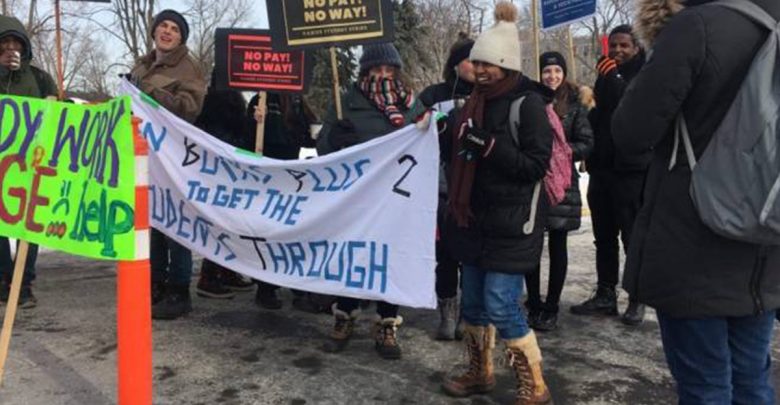 Vanessa Pellicciotta
Vanessa Pellicciotta Post-secondary education is already expensive as it is. Not getting paid for work that requires extensive labour — usually five days a week — makes living as a student even harder.
Students in eastern Canada are fighting back against these hardships. At Vanier College in Montreal, students went on a strike against unpaid internship programs to voice their problems and get the government’s attention. Montreal has a history of students going on strikes for fair pay in internship program; the largest protest happened the week of November 18, which comprised of around 55,000 students from post secondaries across Quebec, including Concordia University, CEGEP du Vieux-Montreal College, Université du Québec, and many more. For majority of these students, internship programs are required in order obtain a degree – these internships are unpaid, making it difficult for students to get by financially.
The new centre-right Coalition Avenir Quebec (CAQ) government has promised to address unpaid internships. Education Minister Jean-François Roberge is insisting that students are being irrational by protesting, that they’re “kicking down open doors” since the government, supposedly, is already working to figure out a solution to this problem that will later be presented to students unions.
However, according a social work student named Lou Taj at l’Université du Québec à Montréal, this task has been very difficult for the government to confront. He mentions that when he went to speak to the government, “nothing interesting got out of it. They said the door is open but there’s no conversation happening.”
Because of this, university students are continuing even more strikes and protests. Concordia University’s students’ union even planned out a strike on a flyer and displayed it at an information session on January 15.
Additionally, there are issues with legal recognition for students working unpaid internships. Students, in addition to pay, also want their internships to be recognized under Quebec’s labour standards law for protection in case of harassment or assault of any sort in the workplace. For example, Laurie Bissonnette, who was working at her unpaid internship program, was subject to sexually charged comments from a male coworker. In order for people like Laurie to feel safe and protected, these strikes are essentially demanding basic workplace rights, things that all workers — including students — should have.
But are these strikes being effective? Students are hoping so. 55,000 is not a small number of people protesting, and through this form of consistent mobilization, it’s in the interests and hopes of the students to make an impact on government policy and improve their lot, no matter how hard or tedious these protests might be.
It’s also in the best interest of students from all over Quebec to continue to protest and demand that the government provide them with basic needs to get by. It’s also important for the rest of us Canadians to stand in solidarity with these people — all students deserve to be properly compensated for the labour they perform.
Like Karl Marx once stated, “freedom is the consciousness of necessity.” Only by acknowledging these students’ basic needs and addressing them fairly will students obtain freedom.




